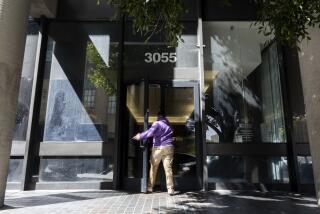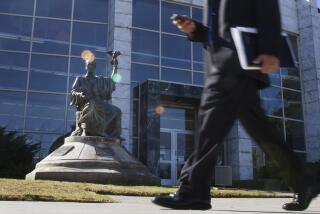Odeh Becomes Victim of the Violence He Decried
Alex M. Odeh, victim of a bombing at the American Arab Anti-Discrimination Committee office in Santa Ana, was described by those who knew him as a soft-spoken man of peace--convinced that American opinion of Arabs could be influenced more by education than by terrorism.
“He did not condone violence,” Christina Boutrof, a close friend, said. “He wanted to educate people on the cultural aspects, not the political ones. . . . His approach was that the better approach was through education, not as a radical, activist terrorist.”
In his capacity as the committee’s regional coordinator, the 41-year-old Odeh would often write letters to newspapers and make public appearances to attack perceived discrimination against or stereotyping of Arabs.
On the night before he was killed, Odeh had been interviewed on TV about the piracy of the Italian cruise ship Achille Lauro. He praised Yasser Arafat, saying the Palestine Liberation Organization had played a positive role in diffusing the affair, and he said the incident showed that “violence breeds violence.”
Message Often Preached
The latter was a message Odeh had preached often in his association with the 5-year-old organization, relatives and colleagues said.
“He was trying to put forth some truth about what is going on in the Middle East,” Ellen Nassab, a sister, said. “He was trying to shed some light on what makes some people (act) temporarily insane.”
Former Sen. James Abourezk, the committee’s national chairman, said Odeh was “one of our best people.”
Based in Washington, the committee was founded five years ago as a grass-roots service organization for people of Arab descent. One goal is to “give them pride in their ethnic heritage,” spokeswoman Hind Baki said. The 13,500-member organization also monitors the media for inaccuracies about or slights against Arabs in news reports or advertising, and provides speakers to present Arab viewpoints at public functions.
First West Coast Director
Abourezk said Odeh was the group’s first West Coast regional director, and as such helped Arab-Americans with health and immigration problems. He also circulated a newsletter, intended in part to generate pride and unity among the Arab community in the region. The group claims about 1,500 members in Southern California and 3,000 statewide.
Odeh was “very quiet,” Abourezk said, “he didn’t talk loudly, he didn’t talk a lot.”
Nonetheless, associates said he often received threats at both his Santa Ana office and at home. They said during particularly heated times, he would have incoming letters screened with a bomb detector.
Odeh “believed in what he was doing,” Abourezk said. “And he sure wasn’t in it for the money.” The pay was less than $30,000 a year, he said.
Father of 3 Daughters
The father of three daughters, Odeh also served as president of the Arab American Organization Council, which represents some of the estimated 40,000 Arab Americans in Southern California.
Odeh also taught Arabic parttime at Coastline Community College. At Coastline, where he had been an instructor for six years, Odeh often lectured on Mideast history and politics. He was recently elected to the college’s Academic Senate. He also had previously taught Arabic at Cal State, Fullerton, where he had received a master’s degree in political science in 1978.
He was also a member of the Los Angeles County Human Relations Commission.
Odeh authored a book of poetry, “Whispers in Exile.” A second book of poetry is to be published shortly. Odeh was a prolific letter and essay writer, particularly on Mideast subjects.
Palestinian-born and a naturalized U.S. Citizen, Odeh had attended Beir Zeit University in the West Bank and later studied economics at the University of Cairo, Egypt. He arrived in the United States in 1967 and became a citizen in 1977. He worked at the Saudi Arabian Cultural Mission in Washington for several years.
He is survived by his wife, Norma, and his daughters, Helena, 7; Samia, 5, and Suzanne, 2.
More to Read
Sign up for Essential California
The most important California stories and recommendations in your inbox every morning.
You may occasionally receive promotional content from the Los Angeles Times.










